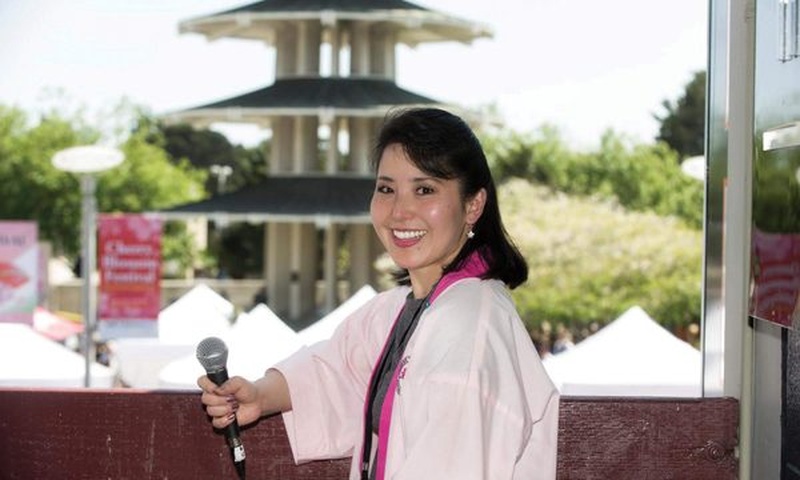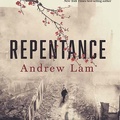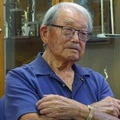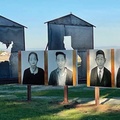SAN FRANCISCO — One of the reasons San Francisco remains a cultural hub is the work of Miki Novitski, whose volunteerism as emcee of the city’s annual Cherry Blossom Festival Grand Parade and as program director for the festival’s Cherry Blossom Queen and Her Royal Court Program has been a delight to thousands of tourists and residents.
This is only one of many San Francisco events Novitski participates in. Asked how she manages to maintain such a frenetic schedule, she said she loves what she does. “Passion for what you are doing is key,” she said. “Otherwise it doesn’t make sense. You have to have passion to do anything well.”
The Cherry Blossom Festival is an annual event held every April to celebrate the vibrancy and color of Asian and Japanese culture, and the diversity of the Japanese American community.
One of the biggest such gatherings in the country, last year over 220,000 visitors attended the event which is open free to the public and held in San Francisco’s Japantown between Geary and Sutter streets.
Held this year on the weekends of April 13 and 14, 20 and 21, the celebration will feature dozens of cultural exhibitions including martial arts displays, ikebana (floral arranging), classical Japanese dance, poetry, calligraphy, bonsai tree growing, taiko drumming; the list seems almost endless.
“You heard the phrase ‘it takes a village,’” Novitski said. “That applies to putting on the Cherry Blossom Festival. All the volunteers depend on each other to put this event on. The hardest part is it takes a lot of time and effort. The more you put into it the more successful it is and you do your best to inspire people.”
In addition to a Grand Parade finale a centerpiece of the event is the selection of the “Cherry Blossom Queen and her Royal Court.” Novitski works with young women of Japanese descent to develop their skills and confidence so they can become community leaders who will preserve traditions as well as be innovative in shaping the future.
“These are young women selected (Queen Program) who take an active part in their community as role models, doing charity and community work for example appearing at benefits, helping to raise money for sponsors and nonprofit organizations who assist people in need,” Novitski said.
Novitski began her involvement with the Cherry Blossom Festival as a girl helping her mother raise money through a food booth for the Sokoji Mission Church in San Francisco, as a dancer in the Grand Parade and as one of the young women on the Queen and Royal Court.
“I started 30 years ago in the Queen Program,” she said. “That’s what I call home.”
She can trace her ancestry to samurai warriors who once lived in the Yamaguchi Prefecture (region) on the southwest side of Honshu Island south of Hiroshima.
During World War II Novitski’s grandfather Shigeharu Katsuyama and wife Natsue were living in Japan where they farmed. Her maternal grandparents Masami and Fusako (Nitta) Kimura lived in Yamaguchi-ken, Japan.
“My grandparents were in Japan during World War II,” Novitski said. “My grandmother (Natsue) had duel Japanese and American citizenship, but her husband Shigeharu was a Japanese national.”
Her father Shigeo Katsuyama had been born in San Francisco but raised in Japan as a boy. Her mother Yoko (Kimura) Katsuyama was born in Japan and would immigrate to the U.S. after the war to marry her father.
“My father came back to the U.S. after World War II and was later drafted into the U.S. Army,” Novitski said, “this was during the 1950’s. My paternal grandfather in Japan had seen my mother and decided to become a match-maker. He called my father back from the U.S. so he could meet my mother. My Grandfather chaperoned my mother and father on dates.”
The couple fell in love and got married.
“My father returned to the U.S. and my mother stayed in Japan until she could book passage on a ship to America,” Novitski said. “This was about 1960. She joined my father in Oakland.”
Shigeo Katsuyama pursued a career working for Japan Airlines and Yoko was a beautician.
The family moved to San Francisco.
By the age of six Novitski began taking piano lessons. She learned from a teacher she described as particularly wonderful, Alla Sviridoff, a Russian native who today is a professor of music at the University of Delaware.
“I was interested in piano because my cousins were studying piano,” Novitski said. “But I was shy. Playing piano and singing in front of an audience was not something I thought I could do.”
She said continuing stage fright has been something she has had to overcome all her life.
“I would take (piano) lessons two times a week,” Novitski said. “My mother would drop me off. In elementary school (Commodore Sloat School) I was singing and doing square dancing, which I thought was fun. I also joined a choir and learned violin.”
She began to adopt the ambitious schedule that would characterize her.
“I went to school and I didn’t have much free time,” Novitski said. “It was the way it was. I wanted to perform well.”
As part of her physical education she took dance classes.
By the time Novitski graduated from George Washington High School (San Francisco) she decided not to seek a career as a concert pianist, but to concentrate on being dancer and singer. She attended San Francisco City College and then San Francisco State College majoring in liberal arts.
“I was doing lots of school activities and performing for nonprofit groups,” Novitski said. “But I was injured in a car accident. I was able to recover about 60 percent of my physical ability. As a result I changed my focus. I don’t dance as much as I used to.”
Novitski worked in administration for the USI Insurance Service Corp., public affairs officer for Sumitomo Bank and then as administrative coordinator of human resources for the Judicial Council of California, the judicial branch of state government.
The list of upcoming community events she coordinates is impressive. They include the Golden Lunar Q with martial arts, music and fashion held on February 10 at the Janet Pomeroy Center in San Francisco, God Bless the USA, a cabaret to entertain military veterans held on May 11 at the Lincoln Theater in Yountville, and on August 10 the Miss Asian America/Miss Asian Global pageant held at the Herbst Theater in San Francisco.
In working with young women to develop their skills, poise and confidence, Novitski has to sometimes deal with egos.
“Everyone is entitled to an opinion and everyone feels they are acting with the best intentions,” Novitski said. “A few act as if entitlement is freely given and are forcefully vocal about their thoughts and opinions. Sometimes I have to be quite blunt with my opinions and deduct points if they continue to be disrespectful to the group at large, but I feel it’s all a part of learning.
The joys of working with intelligent and talented young women outweighs much of the unpleasant attitudes, most of which is rooted by their own insecurities,” she added. “This type of work gives me a unique opportunity to observe and collaborate with these women at a time in their lives when they are searching for who they are and for who they want to be. There are many women I have worked with who are fully vested in life, advanced in their careers and who have families of their own. I share these experiences with committee members and it gives us great pleasure to see our extended family grow every year.”
Novitski has two children of her own, Martin Shigeo Novitski, 22, a master’s degree student working on a teaching program at New York University, and Madison Emi Novitski, a 14-year-old freshman at Lincoln High School with a black belt in karate from the Oyama World Karate Organization.
Novitski said the Cherry Blossom Festival has changed in the 30 years she has been involved with it.
“It’s a different type of demographic group who attend,” she said. “You see newly arrived Japanese nationals and a more mixed ethnic crowd. Today there are more inter-racial married couples.”
She said preserving the traditions of Japan and Japanese American culture gives her satisfaction.
“It’s a rich history,” she said. “You learn a lot about people as a volunteer about their interests and vision. I hope to inspire the younger generations to bring their talents back into the Japanese American community no matter what their talents may be.”
For information on the San Francisco Cherry Blossom Festival go to www.sfcherryblossom.org.
*This article was originally published by Nikkei West on February 14, 2019.
© 2019 John Sammon






